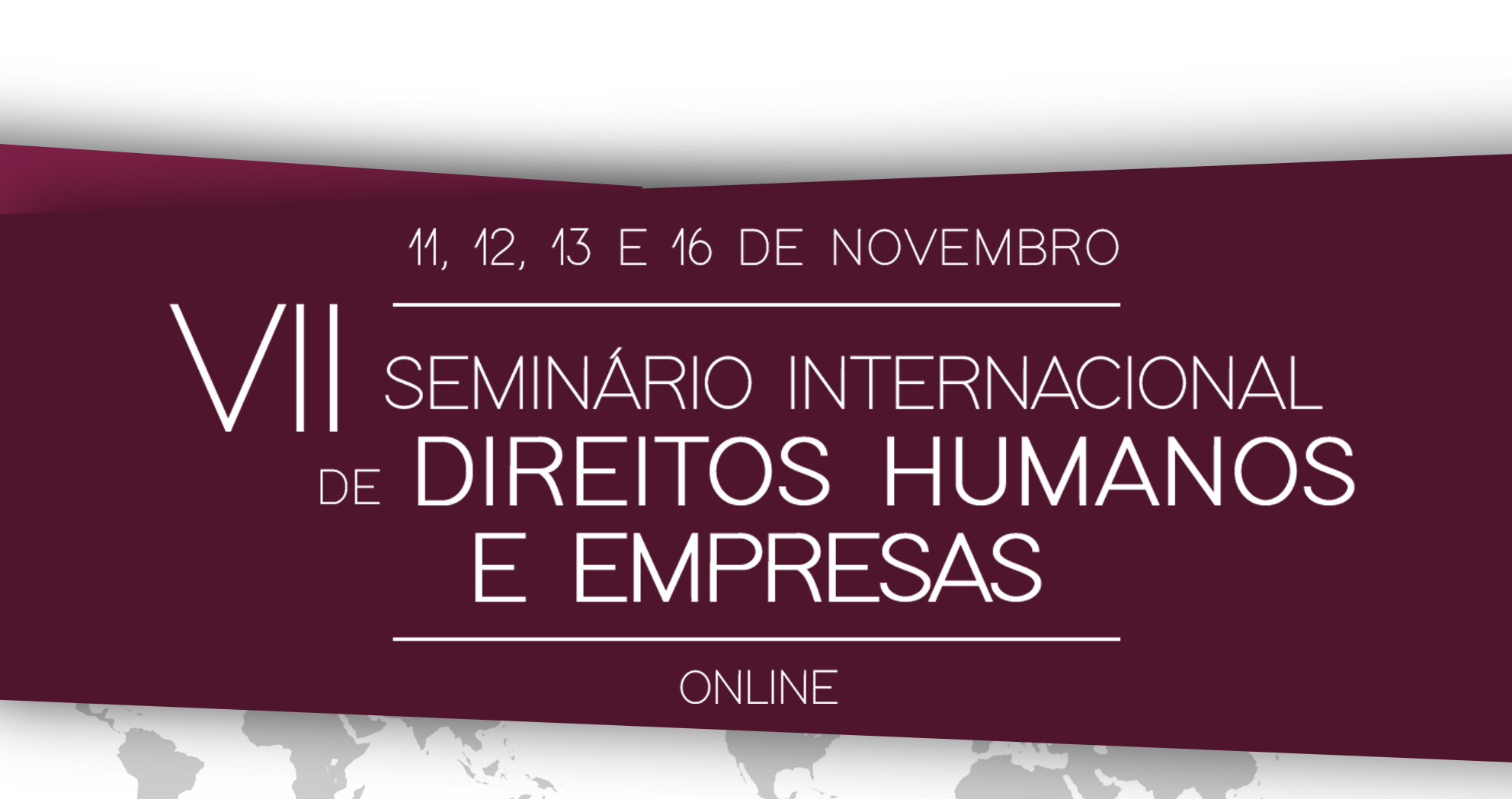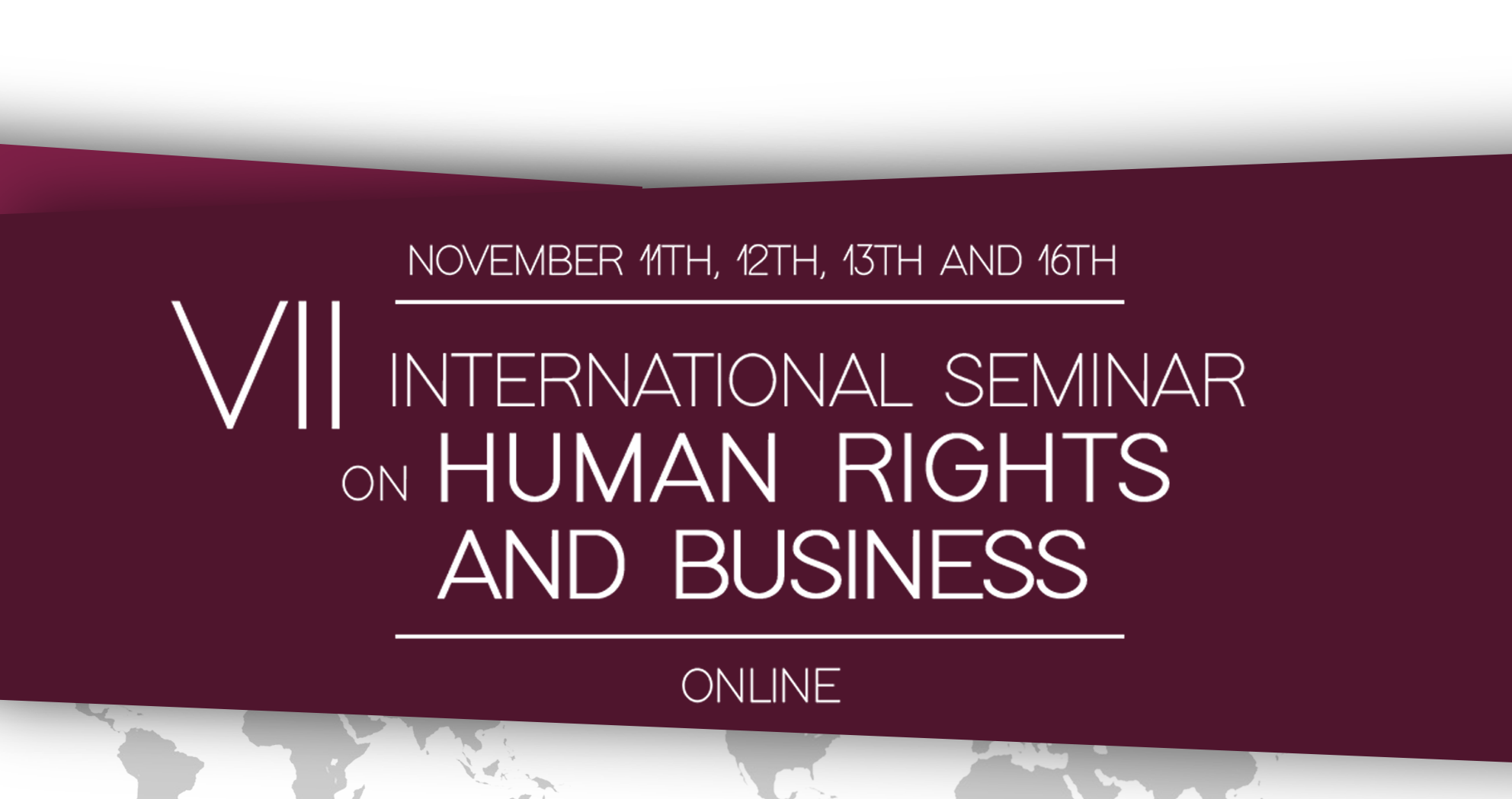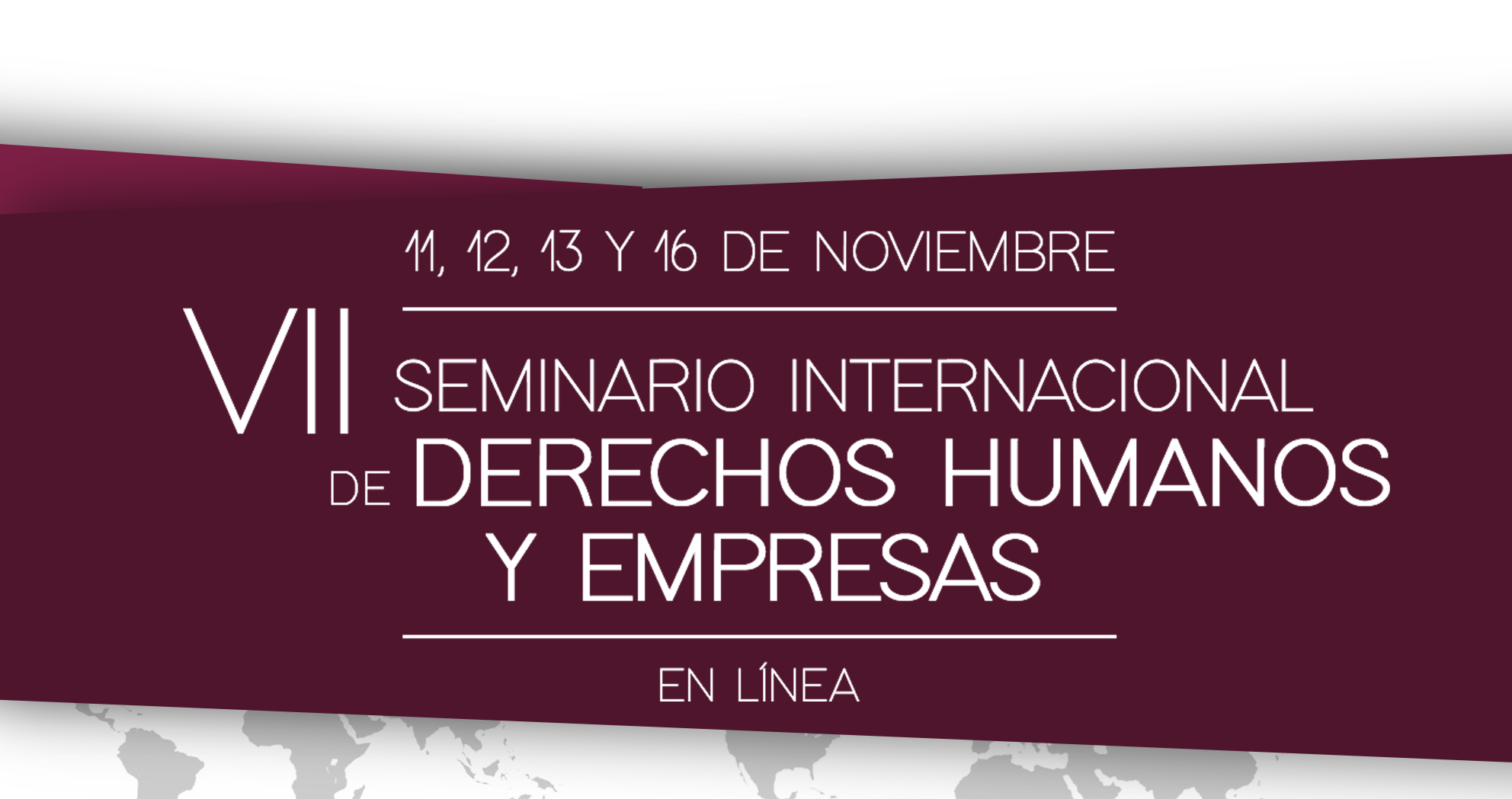*ERRATA IN ART. 4TH, II AND III – 10/23/2020
*ERRATA IN ART. 2ND – 11/02/2020
Homa – Human Rights and Business Centre is promoting, by means of the current public notice, a call for the submission of expanded abstracts to the WGs (Working Groups) of the event, with the publication of abstracts in the annals of the event. Full papers may be submitted to Homa Publica – International Journal on Human Rights and Business, as long as they comply with the publication norms and editorial policy, as well as going through the journal’s evaluation process.
Article 1. The VII International Seminar of Human Rights and Business will held, besides other activities, the development of 3 (three) Working Groups (WGs), indicated below, and their descriptions can be found in Annex I of the current notice.
- International Agenda on Human Rights and Business: strategic litigation and legal instruments;
- National Public Policies on Human Rights and Business;
- Violations involving vulnerable groups and communities in the field of Human Rights and Business;
Article 2. The extended abstracts can be submitted in Portuguese, English or Spanish, and must be forwarded until November 3rd, 2020, exclusively through the electronic form available at http://homacdhe.com/vii-seminar/en/#pg-1117-5, with the indication of the respective WG of the event, and following the terms below:
- The expanded abstract should be written in Arial font, Size 12, line spacing 1.5; with top and left page margins equal to 3 cm, and bottom and right pages equal to 2 cm;
- One version of the abstract must be sent in a .doc or .docx file, with identification of the author(s) (Subitem “c”, “d” and “e” below) and another in .pdf format without identification of the author(s), contemplating the following items:
a) title of the work, in uppercase, centralized and in bold
1) If in Portuguese, it must be followed by the English version below;
2) If in Spanish, it must be followed by the English and Portuguese versions below;
3) If in English, it must be followed by the Portuguese version below;
b) a subtitle, if necessary, separated by two points of the title, on the same line and with the same specifications as the title;
c) full name of the author, skipping one line of the title (or subtitle, if applicable), aligned to the right, in italics, without bold (in the case of co-authorship, insert on the line immediately below the first author’s name, with the same formatting, the name of the second author, and then, if applicable, the name of the third author – only applicable for the file that requires identification;
d) The name of the file with the abstract must indicate the WG for which the work is being submitted to;
e) information about the author(s) must come in footnote inserted next to their name(s), with the same font as the other items, but with size 10, – essentially, institutional link, city and country headquarters, title, ORCID and electronic address – only applicable for the file that requires identification;
f) data related to funding agencies/institutions, when applicable, must come in a footnote inserted next to the title of the work, with the same font as the other items, but with size 10 – only applicable for the file that requires identification;
g) a simple abstract of no more than 100 (one hundred) words, in a justified text (if in Portuguese, it must be sent followed by one version in English or Spanish below);
1) If in Portuguese, it must be followed by the English version below;
2) If in Spanish, it must be followed by the English and Portuguese versions below;
3) If in English, it must be followed by the Portuguese version below;
h) keywords (a minimum of 03 and maximum of 05), aligned to the left, separated by semicolons, in lowercase letters (except for names), without any emphasis (bold, italic or underlined), and if in Portuguese, it must be followed by the equivalent keywords in English or Spanish;
1) If in Portuguese, it must be followed by the English version below;
2) If in Spanish, it must be followed by the English and Portuguese versions below;
3) If in English, it must be followed by the Portuguese version below;
i) expanded abstract text, in Portuguese, English or Spanish, with a minimum of 5000 (five thousand) and a maximum of 7500 (seven thousand and five hundred) characters, including spaces, immediately after the keywords, jumping one line between the items, justified text, with indentation of the first line of each paragraph of 1.5 cm, without insertion of any blank line or special spacing before and after the paragraphs, covering: problem, working hypothesis, theoretical reference, research method employed or to be adopted (according to the stage of research);
j) citations in the text, when necessary, must follow the parameter of name of the author and date (e.g. DOUZINAS, 2010, p.15);
k) bibliographical references, at the end of the abstract text, in alphabetical order (they do not enter in the text’s character count), with the title of the work highlighted in italics (e.g.: FRASER, Nancy. Scales of Justice: reimagining political space in a globalizing world. New York: Columbia University Press, 2009).
Article 3 The Organizing Committee may redirect submissions to other WGs without prior notification or authorization from the respective author(s), according to the relevance of the topic.
Article 4 Abstracts may be written individually or in co-authorship, subject to the following conditions:
- In the case of an expanded abstract written individually, the author must be at least a master’s student;
- In the case of co-authorship, the maximum limit is 04 (four) authors per abstract, and at least (01) one author must have a minimum academic status of a master’s degree, and the others may be graduates or undergraduates;
- Each researcher may submit only 01 (one) individual expanded abstract to the event, admitting, only in the case of co-authorship, the submission of more than 01 (one) expanded abstract by author, provided that they are presented by different co-authors when in the same WG
- Each expanded abstract can only be submitted to one of the WGs of the event.
Sole paragraph. Failure of the researcher(s) to comply with any of the above-mentioned conditions will result in the proposal(s) sent to be disregarded.
Article 5. The abstracts will be evaluated by the Double Blind Review system, that is, the respective files without identification of authorship will be analyzed by two different evaluators, who will give their opinion with a grade from 0 to 10 to the abstract, based on the consideration of the clarity of the text, suitability of the theme to the WG indicated, attention to methodological aspects and relevance of the contribution. In each WG, the abstracts that obtain the 10 (ten) best evaluations (average of the evaluators’ scores) will be selected for the presentation.
Article 6. The results will be released until November 7th, 2020.
Article 7. The accepted and presented abstracts will be published in the Annals of the event.
Article 8. By submitting the work, the author(s) assign(s) their copyright to the Federal University of Juiz de Fora, which will be able to promote them free of charge in any type of media.
Article 9. The full submission of the selected works, the oral presentation, and the publication are subjected to the registration of all authors and co-authors of the work in the event.
Sole paragraph. Registration will be open from November 09th, 2020, and should be made through the online form http://homacdhe.com/vii-seminar/en/#pg-1117-5.
Article 10. The certificate for the oral presentation of papers will be given only to the author that presents it.
Article 11. The presentation of the work will be made in the same language as the work was written (Portuguese, English, Spanish).
Article 12. The dynamics of presentation of works will be defined by the coordinator(s) of each WG, observing the maximum time of 05 (five) minutes of presentation per work (even in case of co-authorship).
Article 13. The best papers may be invited by the Organizing Committee of the event, and the Editorial Board of “Homa Publica – International Journal on Human Rights and Business” to submit the complete article to the evaluation process of the journal in 2021.
Sole paragraph. Only papers that comply with the journal’s publication standards and editorial policy, including the presence of at least one author with a master’s or doctor’s degree, will be selected.
Article 14. The cases omitted in the notice will be decided by the organizing committee of the event.
Juiz de Fora, September 28th, 2020.
Organizing Committee
Annex I – Description of the WGs
- INTERNATIONAL AGENDA ON HUMAN RIGHTS AND BUSINESS: STRATEGIC LITIGATION AND LEGAL INSTRUMENTS.
This Working Group expects abstracts that include studies on the process of negotiation of the Business and Human Rights Treaty at the UN, the role of Regional Human Rights Protection Mechanisms and strategic litigation in these bodies, as well as experiences of judicialization of human rights violations by business, difficulties in achieving access to justice, as well as the evaluation of judicialization strategies and the analysis of their results.
- NATIONAL PUBLIC POLICIES ON HUMAN RIGHTS AND BUSINESS
This Working Group expects abstracts that include discussions on the need to formulate different public policies, which may involve both the Executive and the Legislative and/or Judiciary branches, and which may contribute more effectively to the prevention and/or redress of Human Rights violations by business. It is also possible to address the processes of drafting and monitoring National Action Plans on Human Rights and Business.
- VIOLATIONS INVOLVING VULNERABLE GROUPS AND COMMUNITIES IN THE FIELD OF HUMAN RIGHTS AND BUSINESS
This Working Group expects abstracts that include researches on the protection of communities and especially vulnerable groups affected by large enterprises, focusing on traditional communities, indigenous peoples, and issues of race, gender, sexual orientation, and disability. It is also possible to address specific violations experienced by these populations, the difficulties of access to justice, as well as the need for a targeted look at these groups when developing public policies and binding instruments.



